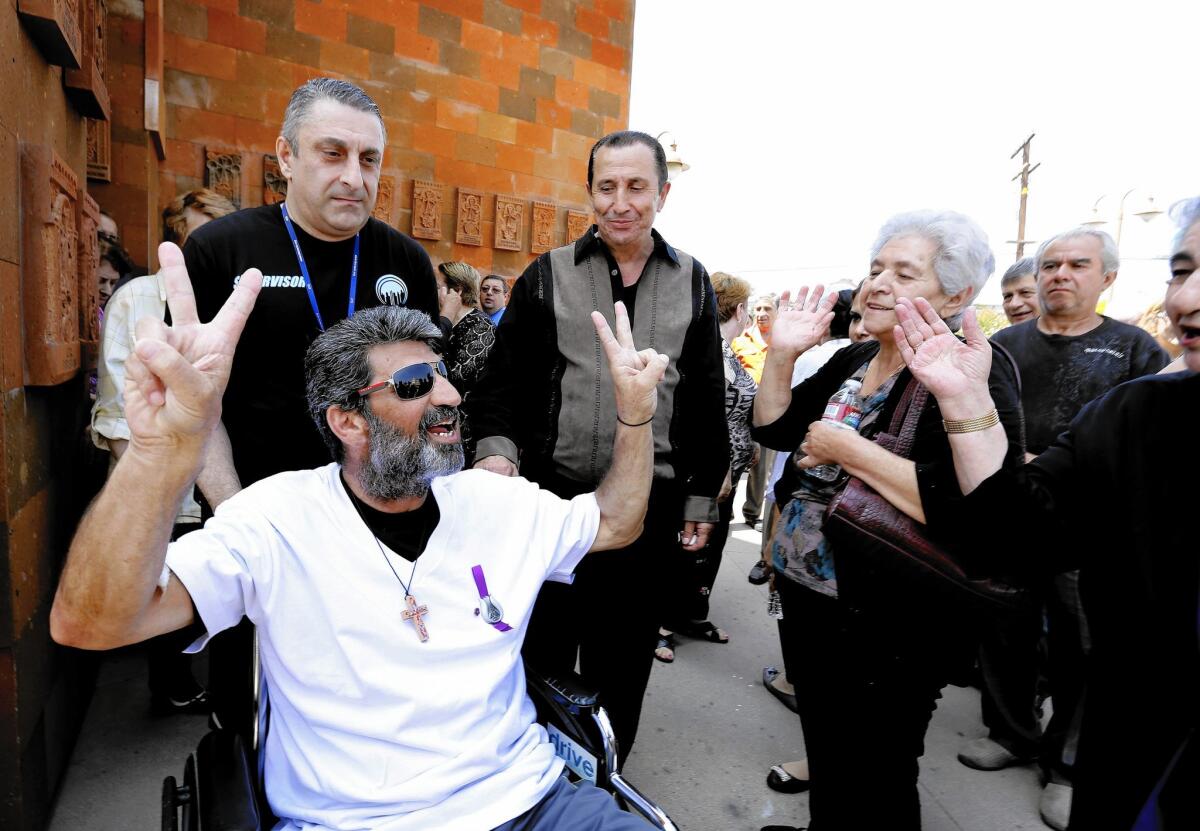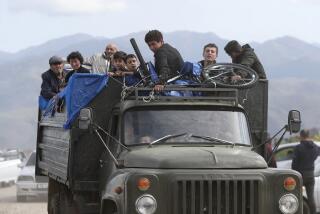Glendale man ends 55-day fast protesting Armenian genocide

Agasi Vartanyan greets a crowd of supporters Thursday in Burbank after leaving the glass enclosure he had been living in during his 55-day fast.
Agasi Vartanyan paced back and forth in the glass box he’s called home for the last 55 days, his voice booming as he chatted on his phone during the final hours of his fast commemorating the Armenian genocide.
As the clock neared 11 a.m. Thursday, he removed a few of the amenities in his makeshift bedroom: a wireless Internet router taped to the window, a blanket and a neon green hand mirror that hung from a wooden wall.
Vartanyan’s fast began April 3 outside a Burbank church, weeks before the 100-year anniversary of the massacre of about 1.2 million Armenian people in their homeland at the hands of Ottoman Turks. The Glendale resident, who conducted a similar protest in Russia in 2006, survived on nothing but bottled water.
“What makes what I’m doing worthwhile is when I see young people remembering their roots and their heritage,” Vartanyan said through a translator. “There is nothing simple or easy about a 55-day fast.”
His reason for fasting precisely 55 days was twofold: He turns 55 this year, he said, and it was important for him to end his fast on May 28, the day Armenians celebrate their independence, survival and creation of a nation.
“Even though they killed us 100 years ago, they did not succeed in killing our willpower or our will to survive,” Vartanyan said. “One hundred years later, we still exist and we are fighting for justice.”
Armenians regard the massacre that took place in 1915 as part of an organized, orchestrated effort by the Ottoman Turkish government. Historians have characterized what happened as a precursor of — even a model for — genocides that followed, including Adolf Hitler’s systematic slaughter of European Jews.
The Armenian people have for years called on the Turkish government to recognize the massacre as genocide. The slayings, Vartanyan said, deserve the same level of recognition as the Holocaust. But that recognition won’t come unless young Armenians fight for it too, he said.
“They are the ones who will continue the struggle until we reach our goal,” said Vartanyan, who lost relatives to the genocide.
The Armenian community’s goal has shifted in recent years from mere recognition to a call for reparations, said Harut Sassounian, president of the Los Angeles-based nonprofit organization Crimes Against Humanity — Never Again, which sponsored Vartanyan’s protest demonstration.
“There was crime committed against our nation and justice has not been done,” Sassounian said. “Restitution is our mission now.”
His organization set up a live stream of Vartanyan’s protest, which drew nearly 20 million viewers.
Gero Ekmekchyan, who has known Vartanyan for more than 50 years, said he wasn’t surprised by his friend’s protest. The pair lived in the same building as children in Armenia, and even then Vartanyan “always cared about society,” Ekmekchyan said.
Vartanyan said he spent a year preparing for the fast, both mentally and physically. He was mentally fit at the end of his protest, but hardly recognizable physically. He had lost 56 pounds.
After a quick group prayer Thursday morning, Vartanyan climbed down from his perch. A flock of doves were released just before his feet touched the ground. After he weighed himself, Vartanyan raised his hands, making peace signs with his fingers, and sat in a wheelchair.
A little girl made her way through a swarm of supporters and handed him peach roses as a medical team conducted a brief check-up.
“I’ve done these things for the memory of the victims,” Vartanyan told the host of Armenian supporters that crowded around him. “You never get anywhere without fighting for it.”
Southern California has long been an expatriate hub for Armenians, with more than 200,000 people of Armenian descent living in Los Angeles County, according to U.S. census data. Among them is Hranoush Deravanesian, an Iranian Armenian who moved to Glendale about five years ago.
Deravanesian said she supported Vartanyan’s fast because it’s important for the world to recognize what Armenians lost a century ago. Her daughters fasted for three days in protest of the genocide about 30 years ago when they were stilling living in Iran, she said.
“Wherever there are Armenians, there will be such protests,” Deravanesian, 67, said in Farsi. “People need to know what happened.”
Despite the physical toll he endured during the fast, Vartanyan said he was happy to make the sacrifice for his country. The activist wouldn’t share his plans for his first meal, but offered a playful hint.
“Whatever I eat,” he said, “it will be the most delicious thing in the world.”
Twitter: @ParviniParlance
More to Read
Start your day right
Sign up for Essential California for news, features and recommendations from the L.A. Times and beyond in your inbox six days a week.
You may occasionally receive promotional content from the Los Angeles Times.






